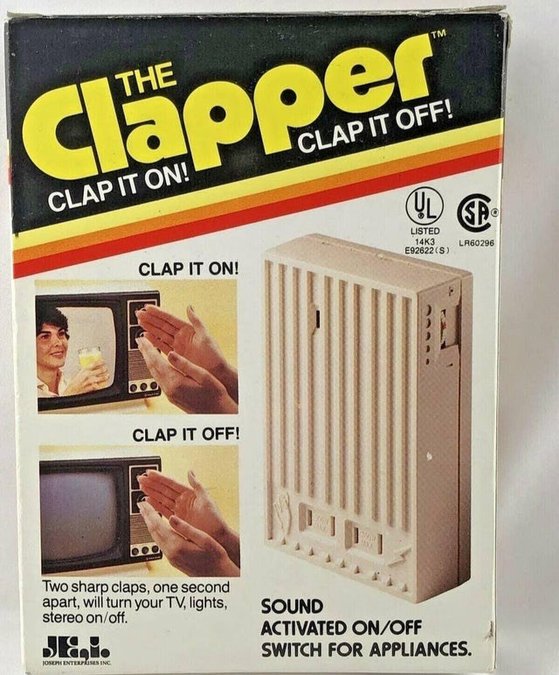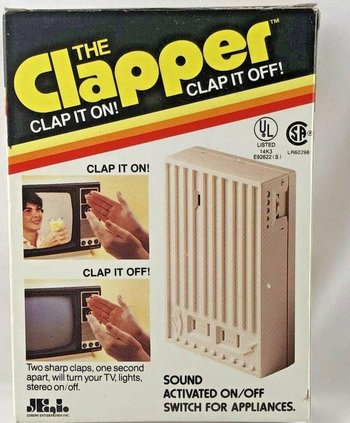Remember the Clapper?
It was the cheesy Stone Age (circa 1984) predecessor to some of the rudimentary tasks Alexa and her kissing cousins perform.
The basic Clapper was and is designed — it is still sold in Amazon et al for $14.95 and up — to turn on and off up to two items such as table lamps, appliances, and even TVs.
Some view it as the gadget that started civilization down the path to the smart home.
It also is part of a long list of modern conveniences that have played a role in modern-day malaises centered around health.
This is not a stretch.
We have overshot the runway when it comes to modern conveniences designed to minimize back breaking labor.
Our general lower level of physical activity today doesn’t do wonders for flexibility, functional muscles, health, or a general overall sense of well-being.
Perhaps if we want to be angry with someone about the condition of health-care in America that is an extension of our collective health, we might want to take a selfie.
Do not misunderstand.
They are people dealt unfavorable DNA, victims of horrendous violence whether it is delivered by a 4,000-pound car in a crash or an assailant. and whose immune systems are not as effective.
But there are a lot of people by their very lifestyle that contributes to the state of health care and health.
The less we keep in motion, the less our body is used for what it is designed to do.
Just like a car battery that you can’t start when it sits too long, our physiological systems weaken when they are not used.
We can spend tons on gym memberships, health supplements, and such but that isn’t necessary if we simply use modern conveniences in moderation.
The goal isn’t to be an athlete. It’s to keep your body in running order.
The Clapper TV commercials demonstrate how we are undermining ourselves in a thousand small ways.
Turn off a light across the room? No need to get up from your chair. Just clap your hands.
Technology is a blessing but it is also a curse.
Vacuums made it easier and quicker to clean a house.
Less sweeping and less rolling up rugs, draping them over clothes lines and beating them.
That took a lot of work
But we are slipping more and more to the Roomba Era.
Pushing a vacuum burned less calories and requires less body movements than sweeping.
Deploying robots eliminates even more low-key day-to-day physical activity.
The worse part, is you could argue the obsession with making the easiest physical tasks even easier or eliminating them entirely contributes in ever so small ways that add up not just to a deterioration of health in the long run but also inflicts pain to the environment as well.
With a thousand apologize to Henny Youngman, take our leaf blowers, please.
You can get a decent mini workout with a rake or a broom.
Not so much with a leaf blower.
We all known by know — at least if you live in California ruled by the climate change cabal — that two-stroke gas-powered “yard appliances” such as leaf blowers do more harm to the environment besides kick up dust and blow lawn clipping down the street.
Yet, how much better are battery powered leaf blowers?
The nicad batteries are not environmentally friendly at the end of their useful life. And instead of burning calories, you’re burning through kilowatts.
We’ve lost mini-workouts with technological advancements.
No one wants to go back to the days before power steering.
But then again, those were the days when you got a bit of a workout simply driving down the road.
The shift for automatic steering made driving easier, but not necessarily safer.
There was a time when driving required one’s undivided attention or else you would have ended up in a ditch if you took your hands off the wheel or were distracted.
Modern-day cars are models of safety and ease.
But it also took away another sliver from basic movements which in turn can diminish strength, flexibility, and ultimately health over time.
Modern medicine is indeed wondrous, at least in most cases.
But it is not a cure-all or a substitute for neglecting the amazing machines that are our bodies.
Instead of looking inward to find answers we lash out at the world.
And in tweeting our anger by taking sadistic delight in the death of a stranger that we have projected our self-righteous indignation over real and perceived failings of the healthcare system we overlook our complicity be it small or large.
Not deliberately exposing ourselves to undo risk.
Striving toward moderation and not excess.
Having machines do simple tasks that once required low-key physical exertion.
Parking as close as we can to a front door of a store to reduce steps.
It all adds up.
So does the seemingly endless anger we pound away at touch screens to express anger.
Perhaps you can blame carpal tunnel syndrome on the healthcare industry as well.
Again, there are those who are in a quandary health-wise via genetics or by a catastrophic event.
But most of us contribute to our health shortcomings in small ways that can eventually create an insurmountable mountain.
We spend years working ourselves into a state of ill health and then expect a magical pill to fix it overnight.
The curious thing about the fatal shooting of the United Healthcare CEO is the lack of a holistic approach to the rage.
There was a time when more than a few insurance companies tried to impose a carrot and stick approach.
The now defunct Foundation Health back in the 1980s tried to incentivize preventative care.
For example, if you took advantage of yearly dental exams and teeth cleanings every six months, they’d pick up 100 percent of the tab. Miss two in a set period and they’d only pay 95 percent.
Ultimately, if you missed enough, your copay would get as high as 20 percent.
Likewise, on dental work beyond preventative care, your copay would rise as well.
The same concept applied to annual physicals and various screening tests.
Foundation Health was a health insurance concern started by doctors.
They saw a real connection between preventative care and the ability to minimize catastrophic conditions by being able to detect and address them sooner.
It went nowhere because employee groups didn’t like its members being forced to do preventative care.
This is not to over simplify healthcare problems or how health insurance is in the state it is today.
But there is more to the problem than how insurance companies operate. A lot more.
And we are all part of the problem and part of the answer.
This column is the opinion of editor, Dennis Wyatt, and does not necessarily represent the opinions of The Bulletin or 209 Multimedia. He can be reached at dwyatt@mantecabulletin.com





